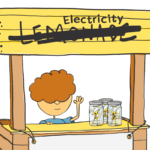Our managing director Julian Kardos talks with Jenny Ruth from the National Business Review about the launch of Electric Kiwi and how we plan to deliver the best value electricity in the market.
Check out the article below
New electricity retailer offers naked power

A new electricity retailer has entered the already crowded market promising to be the cheapest provider.
Electric Kiwi joins more than 20 electricity retailers, although the big five, Meridian, Mighty River Power, Genesis, Contact and TrustPower, who are also the major generators, dominate, claiming about 95% or more of the retail electricity market.
Electric Kiwi's managing director, Julian Kardos, says the largest of the second-tier companies have only between 50,000 and 100,000 customers and most are tiny.
Mr. Kardos says although about 60% of consumers now have smart meters, the major companies aren't offering them the opportunity to use that smart technology, which measures actual energy usage every half hour, to minimise their power bills.
He says Electric Kiwi will not only offer the cheapest prices but will also allow its customers to choose one of two hours each day - either between 2pm and 3pm or between 10pm and 11pm - during which all their power will be free.
Mr Kardos says his company will be able to afford this as it will be paying low wholesale prices during those two periods.
Although a lot of consumer behaviour won't shift - people will still want to shower in the morning before work and they will want to eat dinner in the evening - a reasonable amount of power usage is discretionary, such as running dishwashers, washing machines or appliances that can be set with timers, such as heat pumps.
"If you turn on the appliance for that (free) hour, you can get that power for free at a time when it's cheaper for us to buy that electricity and save money," he says.
That will incentivise consumers to change their behaviour.
Electric Kiwi won't be requiring its customers to sign contracts, to pay connection or break fees, it won't run call centres and it won't issue estimated meter readings.
Instead, it will be offering what it calls "naked power."
Just about all customer contact will be online, although customers will be able to phone either Electric Kiwi or the appropriate lines company in emergencies and Mr Kardos says in exceptional circumstances his staff will pick up the phone and deal with whatever the problem is.
The company's customers must have smart meters and, so far, it has arrangementswith five of the 29 lines companies that cover about 70% of the population.
The areas where it will operate to begin with are Auckland including the North Shore, Hamilton, the Coromandel, Thames, Tauranga, New Plymouth, Palmerston North, Whanganui, Manawatu, Wellington and Christchurch.
Mr Kardos says his company aims to extend its offering to the more rural areas of the country as the penetration of smart meters increases.
But Electric Kiwi won't be offering special "below the line" promotional deals, other marketing gimmicks or such things as prompt payment discounts.
Mr Kardos says his company's analysis suggests companies offering "below the line" deals are doing so at a loss and Electric Kiwi will need to operate profitably.
"We're going to give you our best price up front and we'll give you an hour of power (free)," he says.
Electric Kiwi has had customers since December but has only now formally launched.














